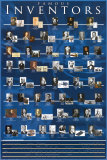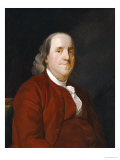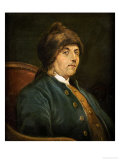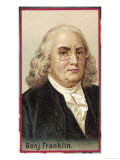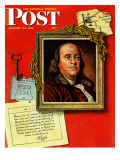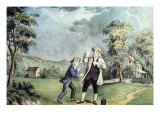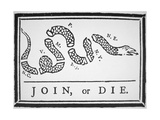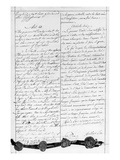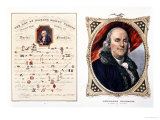Benjamin Franklin Posters, Books, Videos, Links for Learning
|
||||||||||||||||||||||||||||||||||||||||||||||||||||||||||||||
|
social studies > famous men > BENJAMIN FRANKLIN < literature |
||||||||||||||||||||||||||||||||||||||||||||||||||||||||||||||
b. 1-17-1706, Boston, MA d. 4-17-1790; Philadelphia, PA Benjamin Franklin, one of the leaders of the American Revolution, was an author, publisher, journalist, public servant, librarian, statesman/diplomat, scientist/inventor, philanthropist, and abolitionist. Franklin is considered a “Founding Father”, helping win support for American independence, both at home and abroad. Benjamin Franklin was the 10th son of his father's 17 children, a soap and candle maker. Franklin who had just two years of formal education became an apprentice, at age 12, in his older half-brother James's print shop. James treated him badly and beat him, and 1723, Ben ran away. At age 22, Franklin set up his own print shop. He published the Philadelphia Gazette, one of the best newpapers in the colonies, as well as Poor Richard's Almanack, an annual book with weather forecasts, jokes and advice. Sayings form the almanac, such as, “Early to bed, early to rise, makes a man healthy, wealthy and wise,” are still famous today. Franklin was a constant inventor. When he got tired of changing his glasses all the time, he invented bifocals. He also invented swim fins, the lightning rod, and the Franklin stove, which warmed homes better than a fireplace. He conducted famous experiments with electricity and created the first lending library in the colonies. When Franklin retired from the printing business in 1748, he devoted much of the rest of his life to politics. Before the Revolution he spent more than 15 years in England, representing America. During that time, he convinced the British governement to repeal the Stamp Act, a law that placed a tax on the colonies. Franklin returned to America in 1775 and the next year helped draft the Declaration of Independence. In 1776, he went to France to win support for the United States. Not only did France sign a treaty with the U.S., but Franklin became a celebrity there. Parties were thrown in his honor and his picture was sold everywhere. Franklin returned to America in 1785. He was a member of the Constitutional Convention in 1787; in his final years he worked to end slavery. FYI ~ Franklin was friends with George Whitefield, one of the best known preachers in the colonies. QUOTES ~ BENJAMIN FRANKLIN BOOKS, VIDEO, AUDIO The Autobiography of Benjamin Franklin - One of the most popular works of American literature, this charming self-portrait has been translated into nearly every language. It covers Franklin’s life up to his prewar stay in London as representative of the Pennsylvania Assembly, including his boyhood years, work as a printer, experiments with electricity, political career, much more. Benjamin Franklin: An American Life by Walter Isaacson - He was, during his 84-year life, America's best scientist, inventor, diplomat, writer, and business strategist, and he was also one of its most practical – though not most profound – political thinkers. He proved by flying a kite that lightning was electricity, and he invented a rod to tame it. He sought practical ways to make stoves less smoky and commonwealths less corrupt. He organized neighborhood constabularies and international alliances, local lending libraries and national legislatures. He combined two types of lenses to create bifocals and two concepts of representation to foster the nation's federal compromise. He was the only man who shaped all the founding documents of America: the Albany Plan of Union, the Declaration of Independence, the treaty of alliance with France, the peace treaty with England, and the Constitution. And he helped invent America's unique style of homespun humor, democratic values, and philosophical pragmatism. But the most interesting thing that Franklin invented, and continually reinvented, was himself. America's first great publicist, he was, in his life and in his writings, consciously trying to create a new American archetype. In the process, he carefully crafted his own persona, portrayed it in public, and polished it for posterity. Through it all, he trusted the hearts and minds of his fellow “leather-aprons” more than he did those of any inbred elite. He saw middle-class values as a source of social strength, not as something to be derided. His guiding principle was a “dislike of everything that tended to debase the spirit of the common people.” Few of his fellow founders felt this comfort with democracy so fully, and none so intuitively. In this colorful and intimate narrative, Isaacson provides the full sweep of Franklin's amazing life, from his days as a runaway printer to his triumphs as a statesman, scientist, and Founding Father. He chronicles Franklin's tumultuous relationship with his illegitimate son and grandson, his practical marriage, and his flirtations with the ladies of Paris. He also shows how Franklin helped to create the American character and why he has a particular resonance in the twenty-first century. (Product Description) The Americanization of Benjamin Franklin by Gordon S. Wood - From “the preeminent historian of the Revolution” (Jonathan Yardley), a groundbreaking study, many years in the making, of Benjamin Franklin the man, Benjamin Franklin the myth, and the roots of American character. Central to America's idea of itself is the character of Benjamin Franklin. We all know him, or think we do: In recent works and in our inherited conventional wisdom, he remains fixed in place as a genial polymath and self-improver who was so very American that he is known by us all as the first American. The problem with this beloved notion of Franklin's quintessential Americanness, Gordon Wood shows us in this marvelous, revelatory book, is that it's simply not true. And it blinds us to the no less admirable or important but far more interesting man Franklin really was and leaves us powerless to make sense of the most crucial events of his life. Indeed, thinking of Franklin as the last American would be less of a hindrance to understanding many crucial aspects of his life-his preoccupation with becoming a gentleman; his longtime loyalty to the Crown and burning ambition to be a player in the British Empire's power structure; the personal character of his conversion to revolutionary; his reasons for writing the Autobiography; his controversies with John and Samuel Adams and with Congress; his love of Europe and conflicted sense of national identity; the fact that his death was greeted by mass mourning in France and widely ignored in America. But Franklin did become the Revolution's necessary man, Wood shows, second behind George Washington. Why was his importance so denigrated in his own lifetime and his image so distorted ever since? Ironically, Franklin's diplomacy in France, which was essential to American victory, was the cause of the suspicion that clouded his good name at home-and also the stage on which the “first American” persona made its debut. The consolidation of this mirage of Franklin would await the early nineteenth century, though, when the mask he created in his posthumously published Autobiography proved to be the model the citizens of a striving young democracy needed. The Americanization of Benjamin Franklin is a landmark work, a magnificent fresh vision of Franklin's life and reputation, filled with profound insights into the Revolution and into the emergence of America's idea of itself. (Product Description) The Wit and Wisdom of Benjamin Franklin by James C. Humes - A treasury of over 900 quotations spoken by the first "American" as well as numerous entertaining anecdotes about his adventures and misadventures, making it the fourth in the WIT & WISDOM series from RHVP. Covering everything from Sage Sayings to Franklin Fables, it even incudes a time line of Franklin's life and the world around him. (Product Description) Poor Richard's Almanac - Hundreds of delightful aphorisms, carefully selected from many issues of Franklin’s popular 18th-century publication: “Early to bed and early to rise, makes a man healthy, wealthy, and wise”; “Love your Neighbor; yet don’t pull down your Hedge”; “He that lies down with Dogs, shall rise up with fleas” and many more. Ideal sourcebook for writers, public speakers, and lovers of time-honored folk wisdom. (Product Description) Biography- Benjamin Franklin, VHS The Art of Making Money Plenty - At this time when the general complaint is that money is so scarce it must be an act of kindness to inform the moneyless how they can reinforce their pockets. I will acquaint all with the true secret of money catching, the certain way to fill empty purses and how to keep them always full. Two simple rules well observed will do the business: LINKS FOR LEARNING : BENJAMIN FRANKLIN
|
||||||||||||||||||||||||||||||||||||||||||||||||||||||||||||||
|
|
|
|
|
NPW home | Global PathMarker Collection | APWTW Blog | faqs-about | contact | search | privacy |
|
NetPosterWorks.com ©2007-2015 The Creative Process, LLC All Rights Reserved. |
last updated



